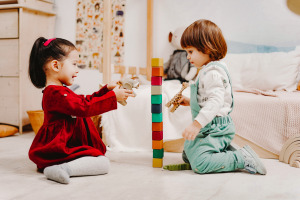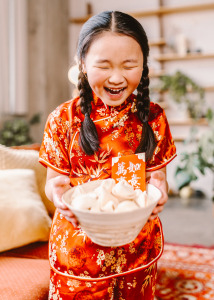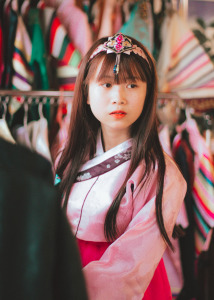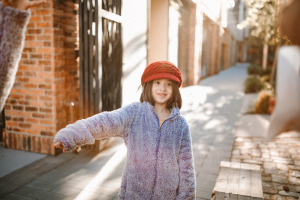We’ve heard from a mother who adopted transracially (thanks, Jessica!) and now it’s time to hear from the adoptees! Interracial adoption is a pretty controversial issue at the moment, so when we engage in these discussions it’s so important to get viewpoints from every side. We’re really excited to share these stories of two young women who were adopted from Asia and raised in White families. Their perspectives are important and eye-opening!
NOTE ABOUT ANONYMITY HERE: Adoptee #1 is from South Korea and has requested to be anonymous. Adoptee #2 is Annie, adopted from China.

Q: Where were you adopted from and how old were you when you came to the US? Do you know anything about the adoption process your parents went through?
Adoptee 1: I was adopted from South Korea at 6 months old. I don’t know much about the process except that it was very expensive, my parents had to go through an intense background check, and they had to figure out where they wanted to adopt from. They looked at South America as well as Asian countries.
Annie: I was adopted from Hefei, China which is south of Beijing in Anhui province. I was 1 year old when my mom adopted me and she’s a single white mom, she never married. About the adoption process, I don’t think I really asked my mom or talked much to her about it.
Q: Do you remember when you started to realize the differences between you and your parents, and what questions did you have about them?
Adoptee 1: They explained to me very early that I was adopted. We had a whole bunch of books about adoption, but only a few were about interracial adoption. They were always very open about it. I remember telling random people as a kid, “I’m adopted!” I don’t think I realized exactly what that meant until I was older. When I was in school and we started doing assignments about family trees, it really started to hit me that I couldn’t do those assignments. Teachers had to alter those assignments for me. Even in college I had to do family genograms, and I couldn’t really do those.
Annie: I did not really realize the differences in race or how people perceived me to be different until I was a little older. I think I was in middle school when I really started to acknowledge that I was an Asian girl in a white family which is something people didn’t see very often.

Q: How did your parents talk with you about being adopted? Were they pretty open from the start?
Adoptee 1: Yes, they were open from the very beginning. They would talk about it in a religious way — saying things like God brought you into our lives, you were specifically chosen for us, we prayed for you. They said I was a blessing and a miracle because they struggled with infertility for years. It would come up in arguments a lot too — I’d say they weren’t my real mom and dad. They don’t know much about my biological parents because they aren’t very good at record keeping in South Korea. I found out later that they’d been told that my mom was in her late 20’s and a businesswoman, but it turns out that South Korea told a lot of people that about the birth mother and it probably wasn’t true.
Annie: Yeah, my mom was definitely super open about it from the start. I think when she talked to me about being adopted, she always phrased it in a positive way. The orphanage I was at found me on the steps of the building and she said my birth parents gave me the option to have a better life and so she really instilled that in my mind. I don’t know how other people’s experiences differ from mine but I have a positive feeling towards being adopted.
Q: Were there ever times you were ultra aware of having been adopted based on your environment and where you grew up?
Adoptee 1: I always went to private Catholic schools growing up, so all the kids I grew up around were white. When my parents wanted to make me feel connected to my Asian heritage, we would go to the neighborhood nearby that was more populated with Asian businesses. It feels kind of like my Asian-ness was fetishized — I’d always be dressed in traditional Asian clothes and I’d get sent to camp with a bunch of other Korean kids. They tried to immerse me in my culture, but I never went looking for it because I felt weird and uncomfortable when I was around only other Asian people.
Annie: So I grew up in Oregon and I live in D.C. now but I went to college in Seattle which is a lot more diverse than Oregon. Growing up in Oregon, I was used to being the only Asian girl because it’s a predominantly white place. I think I started to become ultra aware when people would make comments about my features, and not always in a derogatory way but in a way where they noticed that I was not visibly similar to the environment I grew up in. Whenever I would go out to dinner with my family, sometimes we would get looks like “oh there’s an Asian girl with three white adults”.
View this post on Instagram
Q: Do you know why your parents chose adoption?
Adoptee 1: Because of an infertility problem. They felt that God wanted them to have a child and decided that would probably happen through adoption. They picked South Korea because it was one of the easier countries to adopt from at the time.
Q: Given your unique experience with transracial adoption, does it ever feel isolating?
Annie: I’m used to having friends that aren’t adopted so I don’t really see the flip side but it would be nice to have other people that share a unique life experience like mine.
Q: Would you ever consider adopting? Do you think your experience with being adopted has influenced that decision?
Adoptee 1: I would say I’m open to adoption in the future, but only because I have experience being adopted and have done the hard work of examining my motive for adopting. I would have more in mind in terms of how I’d want to raise my adopted children. I’d probably pursue an open adoption and be more culturally minded — it felt like this fetishized thing when I was growing up, it didn’t feel like part of me. If I did incorporate parts of my child’s culture, I’d make it a regular, every day thing instead of an occasional thing. I still feel disconnected from my Korean heritage. I started learning Korean recently and it felt weird — like I’m trying to be something I’m not. Like I’m trying to be Asian or Korean, and I am in one sense but at the same time I don’t have any of the other aspects — the food, the cultural norms, the language. So trying to acquire those feels like I’m an actor in a role.
Annie: Yeah, I would be open to adopting. I’m not sure if being adopted has affected that too much, but I think personally I would like to have kids that were biologically related to me but I am open to adoption.
Q: Were you exposed to your Asian heritage growing up?
Annie: My mom tried to expose me to Chinese culture from a young age, like she sent me to Chinese preschool and I took Mandarin classes but I wasn’t very interested at that young of an age. I don’t blame my mom because she tried as much as she could. I also went on a trip with my mom in 8th grade to China, through a program for adopted families. So there were 2 other Chinese girls from the same province and it was a very cool experience. When I joined Key Club in high school, there were a lot of Asian kids and I wasn’t used to being around so many Asian people. I found that I was more comfortable in a room full of white people than Asian people. That was very eye-opening.


Q: Have you had any contact with your birth family? Do you have any interest in having contact if not?
Adoptee 1: I have not had any contact with my birth parents, but within the past year or so I’ve become more interested. I’ve reached out to other adoptees and have joined Facebook groups for adoptees. South Korea has a great program for adoptees who want to return and connect to their roots — I can apply for dual citizenship and I can try to connect with my birth parents if I want to. Maybe I have biological siblings. And I wonder if my birth mother thinks of me, and how she’s doing. My mom was adopted too and tried to reach out to her biological parents and was really hurt by that, so I think she’d worry about me or that she’d be hurt if I pursued that.
Annie: Honestly, I don’t really have an interest in contacting my birth family. I think my mom is just the most amazing, strongest woman and I know and she’s my mom. I don’t think she would be upset or anything if I ever wanted to. There are moments when I’m curious but I don’t really have much of an interest.
Q: What do you think the biggest challenges were in growing up with a family of a different ethnicity? Were you taught about your culture and if so, how did you parents go about that?
Annie: I think the biggest thing would be the feeling of in-between-ness. You know, I’m growing up in a family who doesn’t look like me but they’re my family. And when people see us, they might think it’s not cohesive. But at the same time, I didn’t grow up with any Asian or Chinese cultural background. I would say I identify more with the white experience and my family’s white privilege definitely protected me in some regard. Maybe not on an individual level but being in a white family has privileges that come with it, like inter-generational wealth for example. Sometimes I internalize not being Asian “enough”. Like if there are Asian people talking about a certain tradition, it may go over my head. I feel like I can’t add anything to the conversation sometimes because I can’t relate to them on that level.

Q: Is there anything you wish had been done differently growing up in an interracial adoption situation?
Adoptee 1: I’d have wanted healthier race dialogues in general. My parents were very outspoken about Blacks and Whites, but not Asians, and I actually experienced several examples of microaggressions from my parents. Like that scene at the end of A Christmas Story where they go to the Chinese restaurant — my parents always thought that was hilarious. I wish they’d learned more about Asian cultures in general. I wish we’d had better discussion that I, as an Asian person, can still be discriminated against. I kind of brushed it off growing up, but I’m realizing now that it was kind of a big deal. The identity struggle was big too — I feel like I’m white, but I’m not. I loved Mulan growing up, but I also wanted to be a blonde hair, blue eyed white person. One time I dyed my hair blonde and got a lot of people asking me if I wanted to be white.
I don’t like the current way adoption is viewed, especially in the pro-life community. It’s seen as the alternative to abortion. It’s like “adoption is an option,” and those sentiments make me uncomfortable because it’s like you’re using that as an alternative to enforce your pro-birth views. It mixes very easily into white saviorism and the religious component of adoption, but it’s really traumatic when you think about it — I was given up by someone who biologically was capable of loving me, given to strangers, and I have no connection to my culture or heritage. And yet the dialogue is that I should be incredibly grateful.
I think there’s a lot of good that can come from adoption — there are children in orphanages whose parents are dead or don’t have the means to take care of them. They have the opportunity to go to a family who will love and care for them. But I think reunification should be a bigger goal, or at least providing families with the ability to stay together if that’s an option. And if you are planning to adopt, know why you’re adopting. It’s going to be a lifelong process for the child, and you really have to be open to your child’s exploration of that.
Annie: I don’t think so, I think having the experience of being interracially adopted really shaped me into the person I am today. I am passionate about racial equity and I’m interested in other people’s stories no matter what their background is. I learned that there’s more than meets the eye than what’s given to you. People look at me and don’t see the whole story, so that shaped my outlook on life.

These interviews were really eye-opening for us, and hopefully for you as well! Do you have any experience with/insight into interracial adoption? Let us know in the comments!
For More Social Issues, You Should Check Out:
How Transracial Adoption Gifted Me A Son And Made Me A Better Advocate
Celebrities Are Sharing Their Miscarriage Stories — Here’s Why It Matters

